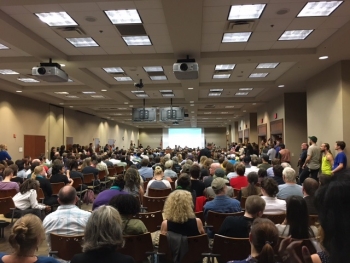
Anthony Rizzi reported on his visit in Baton Rouge at the Public Hearing on the Bayou Bridge Pipeline.
REPORT:
April 12th, 6pm – Galvez Building 602 N. 5th Street, Baton Rouge, LA 70802
The Public Hearing on the proposed Bayou Bridge Pipeline conducted by the Louisiana Department of Environmental Quality and the U.S Army Corps of Engineers, New Orleans District
On April 12th, 2017, nearly two hundred parents, friends, guardians, citizens flood the lower level of the Galvez Building in Baton Rouge to voice their right and free opinion about the proposed Baton Rouge Pipeline. This $750 million infrastructure project will be expand 162 miles across 11 Louisiana parishes into Texas. This is known as the tail end of the Dakota Access Pipeline that has been headlining in news and on social media the past few months. Some protesters of the DAPL attended the hearing on the Bayou Bridge voicing similar issues including the threat to drinking water, irrigating water, local wildlife, and the continuous support of fossil fuel usage. The Bayou Bridge pipeline will only produce 12 permanent jobs and the oil will mostly be for export.
When I arrived the hearing at 6:30pm, I signed the record on behalf of Loyola University New Orleans, against the proposed Bayou Bridge Pipeline. I signed to voice my opinion, but I was slated for 166th spot. Those who lived within two miles of the pipeline were allowed to speak first then those who worked within two miles followed by anyone else. Anyone who spoke were allowed a max of three minutes as usual public hearings go. For the hour and a half I was there, dozens spoke against the pipeline. There was such a powerful energy being in a room full of people sharing the same opinions and fighting the same battle. Most of these short speeches were not scientific, but they were from the heart. A women spoke about her farm which she had since the 1970’s, how it has already been damaged by disappearing wetlands and recent flooding, but it also in danger of being contaminated by a nearby pipeline. If there were to be a leak, which is common among pipeline in the United States, the oil would ruin water these people drink and the food they eat. Members of the Louisiana Crawfish Producers Association spoke about how the pipeline could destroy crawfish habitats; and anyone who knows of Louisiana knows of the signature crawfish culture. Leaders of environmental organizations including the Bucket Brigade, 350.org, and Tulane Environmental Law highlighted Louisiana’s potential opportunity to push the nation into a greener generation with clean energy sources. But if this pipeline will be accepted then the state will only be moving backwards.
This state and this nation is at a turning point in our history to actively decide on what future we want to have, what future we want to give to following generations. I am grateful of the councilmen to listen to the speakers and especially grateful of anyone being there to stand for something they believe in. These turning point we face cannot be done simply by those with political power. Everyone must work together, voice their opinions, and stand for change. Public Hearings like this give me hope because I do see the public reacting. These public hearings have power, not just to speak, but to meet others fighting for the same thing. This creates a network, connections – that is where the true change comes from. The chance to change the world is there, we just have to continue educating, networking, and uniting.
For more information/sources:
Gulf Restoration Network: healthygulf.org
350.org: http://350louisiana.org/
The Urban Conservancy: http://www.urbanconservancy.org/
